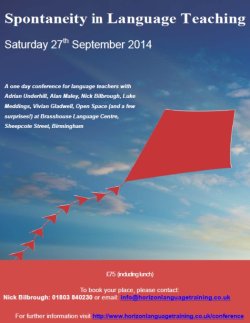Dear HLT Readers,
Welcome to the August issue of HLT. I am writing the editorial in Canterbury where the Pilgrims teacher training summer is in full swing. The ideas behind our teacher training are those of humanism, and are presented in a nutshell in: Course Outline: Creating a Humanistic Learning Community by Simon Marshall, our current Director of Studies. The good news is that some teachers have managed to crack the Erasmus+ grant system and soon will be sharing with you their expertise so that you can also benefit from the grants, too, and come to Pilgrims teacher training in the autumn of 2014, or spring, summer or autumn of 2015.
Some weeks ago I sent out a special e-mail to all those who have joined our free mailing list (If you haven’t joined it yet you might decide to do it now. Look out for the join our free mailing list feature in the left margin). The special mail was a reminder about the Pilgrims scholarship which sponsors the winner to go to IATEFL UK Conference. Last years’ winner was Danijela Bojanić from Serbia who in her article After the Conference shares with us her impressions from the IATEFL Harrogate Conference 2014.
INVITATION FOR GEOGRAPHY AND HISTORY TEACHERS INVOLVED IN BILINGUAL EDUCATION, Toruń, Poland, 3–5 October 2014
For more information click here
|
After I sent out the e-mail reminding you of the deadline I received many e-mails asking some questions and clarification, especially concerning eligibility. Basically, in order to apply you need to be a teacher of English who has never presented at the IATEFL conference before, and can talk about making a difference to their language learners. You apply on-line to IATEFL. Please note I have nothing to do with the administrative side. Also, I am sure you will understand that I cannot give you advice on your proposals as I am involved in the selection process at a later stage. Now it is past the deadline, so good luck next year, and I will remind you of the scholarship in due time. Anyway, it is always good to hear from you, and I always enjoy reading your mails even if I don’t reply promptly. Some of the recent letters or communications are included in the Letters section.
As for this issue, I would like to recommend some of the articles to you. Teachers interested in teaching young learners may first want to look at An Investigation to Establish the Impact of Synthetic Phonics on Teaching Children with English as an Additional Language to Read by Anne Hardy, An Incredibly Simple and Effective Marking Scheme for Young Learners’ Written Work by Alex Case, or An Old Poem With a Modern Twist: The Story of Fidgety Philip, by Hanna Kryszewska.
The Creativity Group & The IATEFL Literature, Media and Cultural Studies SIG
24/25 October 20014 Brookes University, Oxford, UK
For more information click here
|
Those readers who teach secondary and young adult learners may start with Students’ Impressions of Using Educational Manga by Erina Ogawa, Techniques for Teaching Adolescent Learners by Martin Sketchley, or Visiting Exciting Toruń – an Interdisciplinary Project for High School Students by Aleksandra Zaparucha.
There is also the article by Seyit Omer Gok for those who teach at the tertiary level: Learner Autonomy and Learner Training At Tertiary Level In Turkey.
Regardless of what levels and age groups you teach you might want to read about teaching the
productive skills: Developing Pragmatic Skills and Conversational Strategies in Speaking Competence by Talat Bulut, Selcuk Bilgin, Huseyin Uysal, and The Underachieving Students’ Attempt to Cope with the Writing Tasks by Grażyna Kiliańska-Przybyło.

The Extensive Reading Foundation is delighted to announce that the Third World Congress in Extensive Reading has been awarded to the Middle East and North Africa Extensive Reading Foundation who will co-host the Congress with the TESOL Arabia READ SIG. The Congress will be held at Dubai Men’s College in Dubai, The United Arab Emirates from September 18th to 20th, 2015. More details will follow shortly at http://erfoundation.org/wordpress/
|
Another area that many teachers are interested in is teaching pronunciation and intonation. In that case don’t miss: A Phonological Analysis of Errors Made by Iranian Intermediate EFL Learners: A Focus on Prosodic Features by Mehdi Mirzaei, Seyed Mahdi Araghi and Mohammad Reza Hasannejad, and The Importance of Teaching Intonation in EFL Classes by María Gabriela Valenzuela Farías.
For those interested in teaching with technology there are: Differentiated Reading and Writing Instruction with Technology by Cindy Chia-Hui Shen, Code Switching Between English and the Cyber Language through Computer-Mediated Communication: Discussion of Integrating Code-Switching in ESL Classroom by Nadia Nsir and Entisar Elsherif, Review of English Hero - Texthelp's English Language Learning Software by Chris Pim, and Smart Solutions: An Evolution in Educational Publishing by James Hall.
There are also a number of articles on general issues and considerations when it comes to learning and teaching, like: Language Learning Unlocked by Andrew Weiler, 12 Points My 2-Year-Old Reminded Me Of: So I Can Manage My EFL Classes More EffectivelyM by Sezgi Yalin, Basic Global English: A Leaner Lingua Franca for Equality in Global Communication by Bill Templer, and To Be(come) or Not to Be(come) by Cesar Elizi.

The Fair List is to run their first webinar, in collaboration with the IATEFL Leadership and Management Special Interest Group, on ‘Preparing for your first keynote talk or plenary.’
All are welcome to attend and it is especially aimed at women who are thinking about dipping their toes in these waters for the first time.
The speakers will be Susan Barduhn and Simon Greenall.
Susan is a Professor at SIT Graduate Institute in Vermont and a Past President and current International Ambassador for IATEFL. She has been honored to give plenaries in 17 countries.
Simon has been a textbook writer for more years than he cares to admit. Giving plenaries has been an essential but often challenging requirement of the day job.
All those attending the webinar will have the opportunity to put in a proposal for a webinar of their own to Cambridge English Teacher (CET). If their proposal is selected they will have the chance to do their first plenary via audio-only webinar with help from a supportive CET moderator. Thus a great place to start!
Andy Hockley of LAMSIG will moderate. Join us on September 13th 2014 at 15.00 BST (UTC+1). See http://lamsig.iatefl.org/events/webinars for details. Sign up details will be announced nearer the time.
|
Of course there are many practical ideas in: The Things They Said: Using Quotations for Teaching by Simon Mumford, Using Narratives to Present an Integrated Approach to the Development of Target Language Skills and Linguistic Knowledge by Carol Griffith and Jiydegul Alymidin Kyzy, and A Series of Worksheets for Pretty Shrewd by Clive Duncan by Kristina Leitner and Andrew Milne-Skinner. The worksheets will be a real treasure for those who teach English through literature and drama to secondary, young adult and adult learners.
As for publications, in Short Book Reviews you can read about the new fantastic Helbling Young Readers-Fiction. One of the books in the series is Skater Boy which recently won the ERF award. For more about the award and other winners read Extensive Reading Foundation: Language Learner Literature Awards: Winners 2014
In Short Book Reviews you will also find a review of a very interesting book 101 Young Adult Novels For Your Language Class by C. Holzmann (Helbling Languages) which presents novels which might be of interest to your young adult learners. Also a new novel which your learners may be interested in is The Memors by Hilary Crystal. For more about the novel read David Crystal Interviews Hilary Crystal, Author of the Children's Techno-fantasy Novel, The Memors
Finally, for your entertainment read Testing Times: Summer 2014 Edition by Geoff Tranter. The14th edition of his jocular journal "Testing Times", once again shows unexpected connections between linguistics and European news.
Enjoy the August issue of HLT!
Hania Kryszewska
HLT editor
hania.kryszewska@pilgrims.co.uk


For more information click here



|